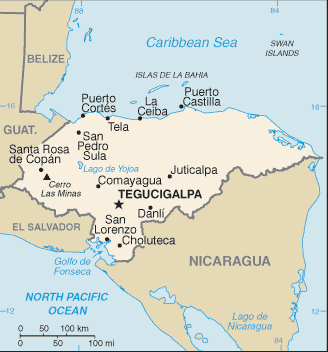Two US agents with the Drug Enforcement Administration shot and killed a man in Honduras last week who was suspected of drug smuggling, in the third instance since May of DEA involvement in the killing of suspects in the troubled Latin American country.
 The shooting took place on July 3 when a small plane suspected of smuggling drugs from South America crashed in eastern Honduras. Whether the DEA had anything to do with the crash has not been disclosed, but several helicopters carrying commando-style squad militias of DEA agents and their Honduran trainee forces swarmed to the crash site.
The shooting took place on July 3 when a small plane suspected of smuggling drugs from South America crashed in eastern Honduras. Whether the DEA had anything to do with the crash has not been disclosed, but several helicopters carrying commando-style squad militias of DEA agents and their Honduran trainee forces swarmed to the crash site.
One pilot was injured in the crash and arrested, while the other “ignored orders to surrender and was shot after making a threatening gesture,” said Dawn N. Dearden, a D.E.A. spokeswoman. DEA agents shot and killed him. About 900 kilograms of cocaine was recovered from the plane.
Just over two weeks ago on June 23, a similar incident occurred during a raid on a home in Honduras. DEA agents armed to the teeth and accompanied by some Honduran security forces shot and killed a suspected drug dealer in what US Embassy spokesman Stephen Posivak said it was a “great example of positive U.S.-Honduran cooperation.”
In May, DEA agents were involved in the killing of four civilians, including two pregnant women, in a botched raid on a boat that was reportedly mistaken for one carrying drugs.
The Obama administration’s expanded mission in Honduras, called Operation Anvil, is run with six US State Department attack helicopters and a special team of commando-style Drug Enforcement Administration agents who have now been implicated in the killing of Hondurans on three separate occasions.
The added State Department and DEA presence is in addition to the more than 600 US troops that are already stationed in Honduras. The DEA is used instead of the military because they have less restrictive rules of engagement.
Increased US-Honduran cooperation has occurred in tandem with widespread human rights abuses and forced disappearances of political opponents and journalists.
The Committee of the Families of the Disappeared of Honduras (COFADEH), a human rights organization, said in a statement last month that “a foreign army [i.e., the U.S. army] protected under the new hegemonic concept of the ‘war on drugs,’ legalized with reforms to the 1953 Military Treaty, violates our territorial sovereignty and kills civilians as if it was in Iraq, Afghanistan, Libya or Syria.”
A group of 40 Honduran scholars and former government officials sent a letter to President Barak Obama and Secretary of State Hillary Clinton earlier this month, demanding the US stop supporting the Honduran military and police. The letter was publicly supported by 300 academics in 29 countries.
“It’s really troubling,” said American University anthropology professor Adrienne Pine, one of the signers. “It’s absolutely not appropriate for U.S. law enforcement to be killing other people in other countries.”
Under the guise of fighting drugs, Washington is imposing itself on countries like Honduras and building a virtual police state. The Obama administration chose to support the illegal military coup in Honduras in 2009, which ousted democratically elected Jose Manuel Zelaya. The coup leaders continued to receive US aid as American military and DEA presence in the country began to expand. This began a descent into what Dana Frank, professor of history at the University of California and an expert on Honduras, called “a human rights and security abyss.”
“We have seen over the years that whenever the military interfaces with the populace, incidents of human rights abuses go way up,” said George Withers, a senior fellow at the Washington Office on Latin America. “We’re concerned that the U.S. is encouraging the use of the military for police work.”


